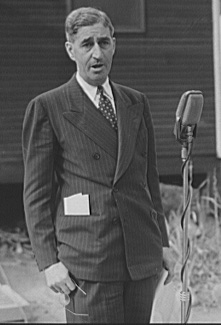9 July 1888–30 Apr. 1941

Alonzo Dillard Folger, attorney, judge, and U.S. representative, was born in Dobson, the son of Thomas W. and Ada Robertson Folger. After attending the public schools, he entered The University of North Carolina where he received an A.B. degree in 1912 and an LL.B in 1914. In the latter year he passed the bar examination and returned to Surry County where he began to practice law in partnership with his brother, John H. Folger, in Mount Airy. On 13 Oct. 1919 he married Gertrude Reece of Dobson, and they later had two sons, Alonzo Dillard, Jr., and Jack.
Although he soon had a flourishing law practice and eventually acquired an interest in the Surry County Loan and Trust Company, one of the county's leading banks, politics proved to have a stronger attraction for young Folger than the law or banking. Possessed of a genius for political organization, he assumed the post of chairman of the Surry County Democratic party and with the assistance of his brother John revived a moribund party. He not only gave Surry a two-party system, but also in the process he created a political machine that by the 1920s could deliver sizable blocs of votes in party primaries to candidates it favored.
The heyday of the Folger organization was in the 1930s after the effects of the Great Depression loosened the Republican leanings of Surry countians, and the Democrats won overwhelming control of all local offices. In 1936, Folger served as state campaign manager for Lieutenant Governor A. H. ("Sandy") Graham in his bid for the Democratic gubernatorial nomination. Although Graham lost, Folger in June 1936 was elected Democratic national committeeman, largely due to the supporters of Clyde R. Hoey, who hoped to win Graham votes for their candidate in the second primary. On 4 November of the same year, Governor J. C. B. Ehringhaus appointed Folger a special judge of the superior court, but he served only slightly more than two months because of his desire to remain national committeeman; he resigned on 10 Jan. 1937.
In 1938, Folger won election to the U.S. House of Representatives from the Fifth Congressional District. Appointed to the Committee on Banking and Currency—an unusual honor for a freshman congressman—he generally gave strong support to the proposals of Franklin D. Roosevelt. Reelected in 1940, Folger was just beginning to establish himself as one of the leading members of the House when, while on his way to deliver a commencement speech, he suffered a heart attack, wrecked his automobile, and died the same day in Mount Airy. He was buried in the Dobson Cemetery.